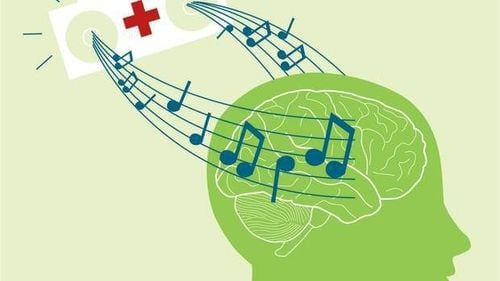This is an automatically translated article.
Most parents have heard of the term "Mozart Effect." This term refers to how listening to classical music can boost intelligence, especially in infants. So is listening to music good for the brain and is it good for children to listen to music?
1. The Mozart Effect
The concept comes from a 1993 study led by Dr. Frances Rauscher, in which researchers played Mozart's piano sonata to a small group of college students and then asked them to complete a spatial reasoning test.
The team then compared these results with scores on spatial reasoning tests done after listening to 10 minutes of a relaxing or silent tape and the team found that, The group exposed to Mozart scored significantly higher.
From this discovery, the media and parents believe that playing music for babies will help children become more intelligent. In practice, however, this is not the result that Dr. Rauscher and her colleagues propose.
As a result, books, CDs and other products advertised as the "Mozart Effect" became extremely popular among babies and children.
Since then, various studies have been done to test the idea that simply exposing children to some classical music can make them smarter and however, the researchers found This theory is unlikely and is not supported by any real evidence.

Nhạc Mozart giúp trẻ thông minh hơn
Several studies, including a December 2013 paper by researchers at Harvard University, found that music does not enhance children's cognitive abilities.
The real story behind the link between music and learning is a bit more complicated than "Mozart makes you smarter". Although there doesn't seem to be a clear relationship between listening or learning classical music and increasing intelligence, research has shown that there are some clear benefits to learning to play musical instruments
2. Psychological benefits of music
Music and Learning
It's easy to see why so many parents are willing to pay so much money for all those music, books and videos that celebrate the benefits of the "Mozart Effect", it's because it gives cognitive benefits for their child with no effort and no downside.
However, there is research that has shown a link between music and learning, but the results are not what we think above. Now that we know that, it's a process not a simple equation like "Listening to Mozart increases intelligence."
>>> Support music education and intervention for children - Stimulate children's musical potential
Although we do not have only one "Intelligence" as measured by a single IQ test (we we have "multiple intelligences", including musical intelligence), studies have shown that passive listening to classical music does not make children smarter. Instead, learning music opens the door to learning and reinforces skills that children will use in life, at school and beyond.
Here are some ways that music can enhance a child's learning and overall development:

Âm nhạc có thể tăng cường bộ nhớ của trẻ,nâng cao khả năng học tập và phát triển tổng thể của trẻ
Learning to promote discipline is practiced as children practice with instruments, learn to get ready for lessons and performances and schedules Build self-esteem Encourage focus Improves coordination Improves memory Helps children's brains in language processing Improves reading skills Increases vocabulary Transmits joy; playing music and listening to music bring joy and excitement to children Encourage a love of learning Provide children with a means for creative expression Provide children with social benefits; playing music is a great way to connect with other musicians, play and enjoy music together In young children, music seems to play a particularly important role in language development. Research shows that music strengthens children's natural ability to decode sounds and words.
In children, the benefits of music (especially learning to read and play music) are related to better language processing and improved reading skills.
The connection between music and learning is clear. The ability to distinguish between similar sounds is important for language development, and skills like rhythm retention are linked to reading ability.
Scientists have also shown that the processing of sounds in the brain is a measure of how healthy the brain is. An inability to process sound (for example, being unable to distinguish and hear friends' voices in a noisy restaurant or party) may indicate an underlying condition such as autism or retardation. learn.

Âm nhạc trị liệu cho trẻ tự kỷ
>>> Music education and music therapy for children with autism
Research also shows that children from lower socioeconomic backgrounds may be at a disadvantage; Poverty and maternal education have been shown to be related to children's ability to process sound.
Scientists have proven that people who play music can hear better in noisy environments than people who don't.
According to research, the sounds we are exposed to change our brains. Similar to how exercise keeps the body healthy, music can help the brain gain auditory abilities, which has been linked to many learning benefits.
Children's musical practice can play an important role in developing important skills to help children learn, such as listening, attention, concentration, memory and reading ability.
3. How to add music to your child's life?
You should not expect classical music to make them smarter; Instead, parents should expose their children to music because it is beneficial for the overall development of the child.
Encourage your child to find an instrument they love and help them build skills and confidence through hands-on lessons. It can take some searching and some trying out different musical instruments to find an instrument or type of music that your child enjoys.

Bố mẹ có thể tìm giáo viên giúp con bạn tìm ra khía cạnh âm nhạc mà chúng
Without playing music, children might enjoy learning about how composers make music and how songs and symphonies are written.
Parents should also take the time to find the right teacher, ideally someone who can help your child find an aspect of music that interests them.
Above all, let your child enjoy music just for fun, not to interfere with learning or for any other purpose. You can encourage your child by telling them about all kinds of music, from Miles Davis to Yo-Yo Ma, to classical composers like Chopin, Beethoven, Bach and yes, Mozart.
In order to effectively support children to develop their musical talents, it is necessary not only to pay attention to the abilities, interests and unique characteristics of each child, but also to understand the general characteristics of the age as well as the children. musical ability of children of that age to provide the most appropriate activities and lessons.
Please regularly visit Vinmec.com website and update useful information to take care of your baby and family.
Articles refer to sources: verywellfamily.com, babycenter.com













